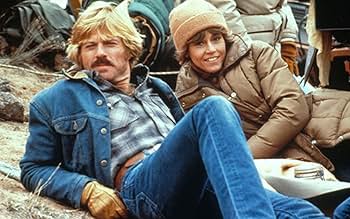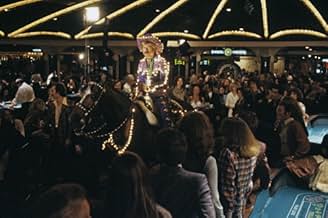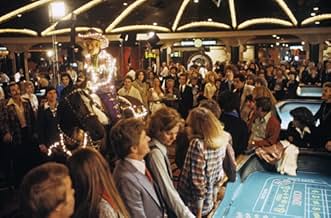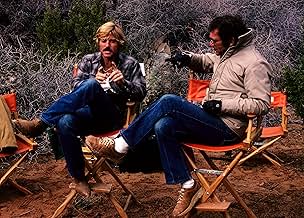AVALIAÇÃO DA IMDb
6,4/10
11 mil
SUA AVALIAÇÃO
Um astro do rodeio que já passou do auge rouba o cavalo de sua empresa e cavalga em direção ao deserto, acompanhado por um repórter agressivo.Um astro do rodeio que já passou do auge rouba o cavalo de sua empresa e cavalga em direção ao deserto, acompanhado por um repórter agressivo.Um astro do rodeio que já passou do auge rouba o cavalo de sua empresa e cavalga em direção ao deserto, acompanhado por um repórter agressivo.
- Direção
- Roteiristas
- Artistas
- Indicado a 1 Oscar
- 1 vitória e 1 indicação no total
James Sikking
- Dietrich
- (as James B. Sikking)
Quinn K. Redeker
- Bud Broderick
- (as Quinn Redeker)
Lois Hamilton
- Joanna Camden
- (as Lois Areno)
Avaliações em destaque
This movie stars Robert Redford as an five time rodeo champion who is now a has-been promoting a breakfast cereal. Jane Fonda is a reporter who wants to interview Redford, but he just blows her off. Redford is basically upset always being told what to do and he steals a 12 million dollar horse that they're mistreating and he's going to take it out and set it free. The company that owns the horse wants to keep it quiet and then wants to send in the police. Fonda tracks him down and joins up with him so she can get a bigger story and of course, they have to fall in love. This movie seems to be a cross between It Happened One Night and Lonely Are The Brave. This was directed by Sydney Pollock who has worked with Redford several times before and also with Fonda.
In the days when people treated one another with more civility, sound bites (bights) and high-energy opinion didn't rule the political scene, and sensationalism didn't masquerade as being newsworthy, Hollywood's film industry was cranking out fare that didn't placate to the juvenile demographic.
"The Electric Horseman" is a forward thinking film populated with adult actors that have adult sensibilities. There are no quick put-downs and one-liners comprised of single syllable words. And when I say adult, I don't mean the bawdy toilet film making styles that literally pollute the media air.
"The Electric Horseman" is mainstream cinema from the closing era of the 1970s. When people wearing ties and blouses attended the movie house, and did so politely.
In this regard "The Electric Horseman" is a throwback to another era when people had more comport in their personal presentation, and demonstrated an amount of civility and societal understanding. Even so, corporate greed is exposed in the plot, as well as the foibles of a femme-reporteress whose hunger for success shows her inner soul to both character and audience (appropriately played by Jane Fonda).
The stalwart American society is also appropriately reflected in Robert Redford's character, who gives us a character who must rediscover his "awe shucks" self through an act of humanity for the sake of a stricken and exploited living, breathing creature that cannot speak for itself; Rising Star.
Cinematography is professional, as are all elements of this film. No performance is overstated, save for Fonda, but, if I know Pollack, that was intentional. The feminist climbing the media ladder and forgetting her ideals by breaking the rules for the sake of those ideals, is met with the has-been buckaroo who has similarly rediscovered who and what he is.
The romance is standard Hollywood 101, but, though not entirely necessary, is still appropriate, and in this regard, probably satisfying to the audience--men and women alike.
It's not a deep film on a personal level, but it is profound on the character level. We sympathize with the characters and identify with them in a detached manner. They are extensions of us (or what we might've been) were we in those situations.
No flashy cuts, no CGI, no rumbling sound effects, no splashy cinema effects of any-kind, standard lensing, tight scripting, and solid thesping make this film a sight for sore eyes.
Thank you Mister Pollack, Mister Redford... and I'd never thought I'd say it, but, thank you "Mizz" Fonda.
"The Electric Horseman" is a forward thinking film populated with adult actors that have adult sensibilities. There are no quick put-downs and one-liners comprised of single syllable words. And when I say adult, I don't mean the bawdy toilet film making styles that literally pollute the media air.
"The Electric Horseman" is mainstream cinema from the closing era of the 1970s. When people wearing ties and blouses attended the movie house, and did so politely.
In this regard "The Electric Horseman" is a throwback to another era when people had more comport in their personal presentation, and demonstrated an amount of civility and societal understanding. Even so, corporate greed is exposed in the plot, as well as the foibles of a femme-reporteress whose hunger for success shows her inner soul to both character and audience (appropriately played by Jane Fonda).
The stalwart American society is also appropriately reflected in Robert Redford's character, who gives us a character who must rediscover his "awe shucks" self through an act of humanity for the sake of a stricken and exploited living, breathing creature that cannot speak for itself; Rising Star.
Cinematography is professional, as are all elements of this film. No performance is overstated, save for Fonda, but, if I know Pollack, that was intentional. The feminist climbing the media ladder and forgetting her ideals by breaking the rules for the sake of those ideals, is met with the has-been buckaroo who has similarly rediscovered who and what he is.
The romance is standard Hollywood 101, but, though not entirely necessary, is still appropriate, and in this regard, probably satisfying to the audience--men and women alike.
It's not a deep film on a personal level, but it is profound on the character level. We sympathize with the characters and identify with them in a detached manner. They are extensions of us (or what we might've been) were we in those situations.
No flashy cuts, no CGI, no rumbling sound effects, no splashy cinema effects of any-kind, standard lensing, tight scripting, and solid thesping make this film a sight for sore eyes.
Thank you Mister Pollack, Mister Redford... and I'd never thought I'd say it, but, thank you "Mizz" Fonda.
Everyone involved in "The Electric Horseman" is taking it easy. The film is just a lark for some very talented people, and while it does have its amusements it doesn't add up to much. Robert Redford plays a rodeo-star who steals his celebrated horse, planning to ride it up to hill country to release it in the wild, but he's dogged by inquisitive female reporter Jane Fonda. There's a message about wildlife to be had in Robert Garland's exceptionally thin script, which must have attracted both Redford and Fonda, but director Sydney Pollack wisely concentrates on the leads' budding romance, and the horse takes the proverbial backseat. Some of the repartee is sharp, but the movie doesn't particularly look good or seem fully thought out. As a result, it's unmemorable and undemanding, though not without minor enjoyment. **1/2 from ****
I like Pollack. I'm not sure there's anything that I wouldn't at least give a chance, as long as he had an important part in the making of it. This is probably the most formulaic thing I've seen of his... which isn't to say that it's necessarily bad. It's just that, well, if you don't see the majority of what happens in this, coming, the likeliest explanation is that you haven't seen one of the many films that follow essentially the same plot. It's not exactly unpredictable. The points of it are also made in a pretty see-through manner, with poignant speeches and the like. But with those in mind, and the fact that this isn't necessarily meant to be taken too seriously, this isn't bad. The direction is effective. Its editing and cinematography are well-done. The acting leaves little to be desired. The writing is good. The characters are at least average. The music is very fitting. That would be the original version, with Willie Nelson performing it, not the other kind. There is a limited amount of language in it, of varying degree, not a lot of which is terribly harsh. The drug/alcohol material is vague, and the sexuality tends to be tastefully done(for being partially set in Las Vegas, this is mighty clean). I recommend this to any lovers of the four-legged animal, Redford, Fonda and/or anyone else who helped create this. 6/10
OK, first, to the reviewer that suggested "too much Fonda" and would have liked to see Susan St. James or Jennifer Warren in the role of Alice, you are forbidden from ever reviewing again. Fonda was perfect, and more on that later.
Second, this is not about a cowboy freeing a horse who is about to be drugged, as some reviewers have said. The horse was drugged from the beginning. Sonny noticed it, and that was a contributing factor to his subsequent actions.
This movie is about a man who strayed far from who he was, and who sought to find himself again. The horse is metaphoric: it is drugged, exploited, and broken, just like the man. So, the man attempts to find himself, as he helps the horse find itself again, so to speak. And, in the process of trying to report the story, the Fonda character attempts to find herself as well, for she has become neurotic, pill-popping, and uptight in her quest to become a star reporter. And, of course, as they travel the countryside, we find America.
Back to Fonda. Fonda's casting has always been that of the strong but flawed "career" woman, from "Barbarella", to "Klute", to "Electric Horseman". She is independent, doesn't need a man. As the tough and aggressive reporter in personal crisis, she is cast perfectly. St. James has neither the strength nor the necessary equal dose of vulnerability that Fonda can muster. This is about chemistry as well. Redford and Fonda have teamed up before, and the chemistry is proved.
So this brilliant and simple story illustrates and creatively reinforces the the idea of straying from true nature, and the need to find it again.
VERY good film.
Second, this is not about a cowboy freeing a horse who is about to be drugged, as some reviewers have said. The horse was drugged from the beginning. Sonny noticed it, and that was a contributing factor to his subsequent actions.
This movie is about a man who strayed far from who he was, and who sought to find himself again. The horse is metaphoric: it is drugged, exploited, and broken, just like the man. So, the man attempts to find himself, as he helps the horse find itself again, so to speak. And, in the process of trying to report the story, the Fonda character attempts to find herself as well, for she has become neurotic, pill-popping, and uptight in her quest to become a star reporter. And, of course, as they travel the countryside, we find America.
Back to Fonda. Fonda's casting has always been that of the strong but flawed "career" woman, from "Barbarella", to "Klute", to "Electric Horseman". She is independent, doesn't need a man. As the tough and aggressive reporter in personal crisis, she is cast perfectly. St. James has neither the strength nor the necessary equal dose of vulnerability that Fonda can muster. This is about chemistry as well. Redford and Fonda have teamed up before, and the chemistry is proved.
So this brilliant and simple story illustrates and creatively reinforces the the idea of straying from true nature, and the need to find it again.
VERY good film.
Você sabia?
- CuriosidadesThe name of Sonny Steele's horse in the film is "Rising Star". The star steed was played by a 5-year-old bay thoroughbred called "Let's Merge" after a 6-month equine talent search. Robert Redford bought the horse after production was complete and owned him for 18 years before the horse passed away.
- Erros de gravaçãoThe video footage shown on television of Sonny Steele's speech about the horse doesn't match what Alice would have actually shot. The camera movement, lighting and direction of where Steele was facing while talking is completely different.
- Versões alternativasThe film's original soundtrack has been changed in different ways for its two DVD releases:
- The Image DVD replaces Dave Grusin's beautiful "Freedom Epilogue" score music (where the horse is set free) with a reprise of "My Heroes Have Always Been Cowboys" by Willie Nelson, originally heard during the opening credits. This actually works well, though one wonders why a piece of original score had to be changed.
- The newer Universal release goes a step further, removing "My Heroes Have Always Been Cowboys" from the opening credits (and in fact from the film completely) as well as "Freedom Epilogue" and replaces them both with a very inappropriate generic harmonica-driven instrumental which is meant to sound like a Willie Nelson song.
Principais escolhas
Faça login para avaliar e ver a lista de recomendações personalizadas
- How long is The Electric Horseman?Fornecido pela Alexa
Detalhes
- Data de lançamento
- País de origem
- Central de atendimento oficial
- Idioma
- Também conhecido como
- El jinete eléctrico
- Locações de filme
- Empresas de produção
- Consulte mais créditos da empresa na IMDbPro
Bilheteria
- Orçamento
- US$ 12.500.000 (estimativa)
- Faturamento bruto nos EUA e Canadá
- US$ 61.801.971
- Faturamento bruto mundial
- US$ 61.801.971
Contribua para esta página
Sugerir uma alteração ou adicionar conteúdo ausente

Principal brecha
By what name was O Cavaleiro Elétrico (1979) officially released in India in English?
Responda





















